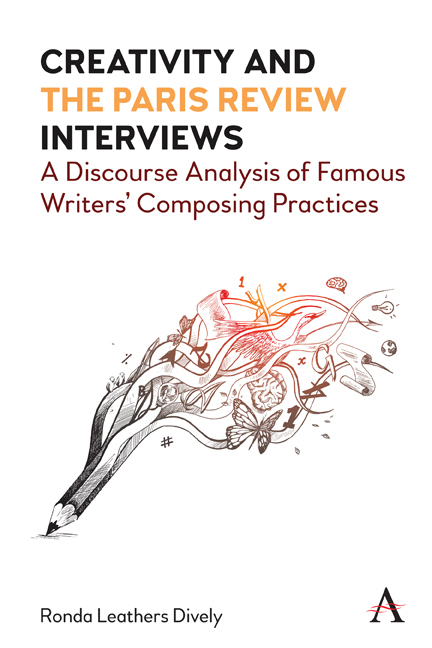 Creativity and 'the Paris Review' Interviews
Creativity and 'the Paris Review' Interviews Book contents
- Frontmatter
- Contents
- List of Illustrations
- Preface
- Acknowledgments
- 1 Impetus, Contexts and Methods
- 2 Composition through the Lens of Creativity Theory
- 3 First Insight, or the Glimmer of Possibility
- 4 Preparation, or Research Broadly Conceived
- 5 Incubation, or Breaks from Conscious Attention
- 6 Insight, or the Eureka Experience
- 7 Verification, or Evaluation
- 8 Emergent Patterns
- 9 Implications for Writing Instruction
- Appendix A Coding Table
- Appendix B List of Cited Paris Review Interviewees
- Appendix C Diagram of Analytical Categories, Subcategories and Themes
- References
- Index
2 - Composition through the Lens of Creativity Theory
Published online by Cambridge University Press: 27 April 2022
- Frontmatter
- Contents
- List of Illustrations
- Preface
- Acknowledgments
- 1 Impetus, Contexts and Methods
- 2 Composition through the Lens of Creativity Theory
- 3 First Insight, or the Glimmer of Possibility
- 4 Preparation, or Research Broadly Conceived
- 5 Incubation, or Breaks from Conscious Attention
- 6 Insight, or the Eureka Experience
- 7 Verification, or Evaluation
- 8 Emergent Patterns
- 9 Implications for Writing Instruction
- Appendix A Coding Table
- Appendix B List of Cited Paris Review Interviewees
- Appendix C Diagram of Analytical Categories, Subcategories and Themes
- References
- Index
Summary
As established in Chapter 1, the ultimate goal of this study is to mine a collection of The Paris Review (PR) interviews for advice that expository writers might employ to negotiate writing challenges and facilitate their composing processes. Chapter 2 lays theoretical groundwork for such cross-genre application since some readers—though accepting that wisdom drawn from the interviews could be helpful to fiction writers and poets—might be skeptical of the notion that this same wisdom could benefit writers of news articles, academic papers, blog posts and other expository texts. Perhaps such skepticism is to be expected given that, historically, writing curricula have maintained rather sharp divisions between expository composition and creative writing. Painting an especially bleak picture of this situation, compositionist George T. Karnezis differentiates between what he terms the “Creative Writing Oasis,” where students enjoy the fun and imaginative work of fashioning stories and poems, and the “curricular Wasteland” of “other school-taught ‘writing’ ” courses, where students are subjected to the drudgeries of preparing for subsequent coursework and careers. This educational architecture is displayed in overtly labeled “creative writing assignments” that celebrate freedom, risk-taking and inventiveness in contrast to expository assignments that impose rigid formulas and regurgitation of others’ ideas, often in strict adherence to standardized assessment initiatives.
Troubled by these disciplinary divisions between composition and creative writing and the damage they can do, especially in the eyes of students, several rhetoric and composition teacher/scholars in line with Karnezis have questioned the practice of so radically distinguishing the two fields. A pioneering voice in this conversation, Wendy Bishop argued years ago that language curricula “need to be crossing the line between composition and creative writing far more often than [they] do” and that, perhaps, they need “to eliminate the line entirely.” In support of her contention, Bishop relates stories of confusing school-imposed distinctions between creative and expository genres, as she depicts former students who struggled with defining and/or satisfying expectations relevant to appropriate subject matter, presumed target audiences and required truth value of claims or observations. To combat such confusion, Bishop recommends including fiction and poetry in firstyear writing courses; sharing various forms of writing research in all writing classrooms; studying the “best, most exciting, most creative texts in all genres”; and viewing teachers and students, first and foremost, as writers.
- Type
- Chapter
- Information
- Creativity and 'the Paris Review' InterviewsA Discourse Analysis of Famous Writers' Composing Practices, pp. 19 - 34Publisher: Anthem PressPrint publication year: 2022


